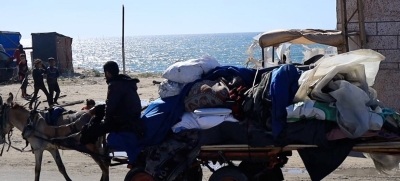UNITED NATIONS, Oct 18 (IPS) — The humanitarian situation in and around the Gaza Strip—which continues to unfold as we speak—can only be described as an utter catastrophe.
In just 10 days since Hamas militants attacked Israel on 7 October, the death toll has already exceeded that of the 2014 hostilities, which lasted more than 7 weeks. So far, more than 2,800 Palestinians have been killed, more than 10,850 injured and hundreds are believed to be trapped under rubble.
Israeli authorities have also now confirmed that 1,300 Israelis have been killed and more than 4,100 injured. Nearly 200 remain captive. They must be treated humanely; hostages must be released immediately.
Humanitarians have not been spared. Fifteen UNRWA staff and five from the Red Cross and Red Crescent Movement have been killed. UN premises are among the vast number of civilian objects damaged.
As hostilities escalate, these numbers will only rise, and an already dire humanitarian situation will continue to deteriorate.
The United Nations, from the Secretary-General down, is deeply concerned about the situation. Even before the Government of Israel announced that Palestinians living in northern Gaza should leave for their safety, mass displacement had already taken place.
It is now estimated that as many as 1 million people have fled their homes to other parts of Gaza. In reality, civilians have nowhere to go—nowhere to escape the bombs and missiles, and nowhere to find water or food, or to escape the unfolding humanitarian catastrophe.
As civilians are packed into an ever-smaller area, the essentials they need to survive—shelter, water, food, power and medical care—have all but run out.
UNRWA schools shelter more than half of the displaced population in central-south Gaza. UNRWA is doing what it can to address the growing needs, but its capacity is at full stretch. Without more fuel, it will only be able to operate the small desalination plants in those shelters for a few more days.
Concerns about dehydration and waterborne diseases remain high given the collapse of water and sanitation services. Although Israel partially resumed the water supply to eastern Khan Younis over the weekend, other networks are so damaged that they could not deliver even if turned on again.
On Monday, UNRWA secured five trucks-worth of fuel to operate Gaza’s main seawater desalination plants, but this will only keep the facilities operational for a week or so.
Fuel reserves at Gaza’s hospitals have also been almost totally depleted. 20 out of 23 hospitals in Gaza were already only offering partial services. As generators and back-up generators run dry, critical life support systems will shut down and these hospitals—which are filled with the chronically ill and civilian casualties of war—will be thrust into darkness.
As every hour passes, the restoration of essential supplies and services, and the need to get humanitarian assistance into Gaza becomes ever more critical. The Emergency Relief Coordinator, Martin Griffiths, is joining a UN delegation to the region over the next few days in pursuit of these urgent objectives.
Humanitarian supplies are on standby. The UN and other humanitarian organisations have stocks of food, water, non-food items, medical supplies and fuel available in Egypt, Amman, the West Bank and Israel ready to be delivered now or within hours.
Emergency funding has also been made available. On 11 October, the ERC approved a rapid response allocation of $9 million from the Central Emergency Response Fund, bringing the total CERF funding for the OPT to $15 million.
The OPT Humanitarian Fund is also reprioritizing an existing allocation of $9 million to respond to the crisis, although this will deplete the humanitarian fund.
The UN will continue to engage with the parties and States with influence to identify urgent solutions to getting humanitarian access to Gaza so we can deliver these supplies; to secure humanitarian access throughout the territory; and to allow UN and NGO personnel in and out of the Strip.
A humanitarian suspension of hostilities would provide the space for this to happen, for civilians to move safely, and some respite from the bloodshed.
We will continue to demand respect for international humanitarian law. Civilians and civilian infrastructure must be protected and humanitarian relief must be facilitated, as international humanitarian law demands. We urge all countries with influence to insist on respect for the rules of war and the avoidance of any further escalation and spillover.
And we continue to call for humanity to prevail.
Footnote: This briefing on the humanitarian situation in the Gaza Strip took place before the devastating bombing of a hospital where more than 500 civilians were killed.
Joyce Msuya is Assistant Secretary-General for Humanitarian Affairs and Deputy Emergency Relief Coordinator.
IPS UN Bureau






